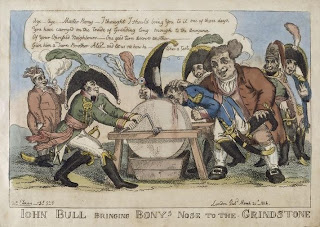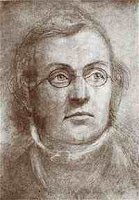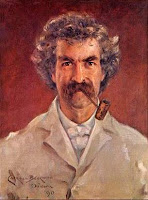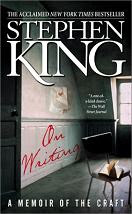I’m about to dive into what I will call The Next Historical until such time as I have a working title. I’ve also been listening to the RWA 2010 Conference DVD. Right now I’m going through the craft track sessions. For those who don’t know, the RWA National conference records nearly all the workshops which are then available for purchase as a DVD or individually. There are sessions on writing craft, the business of writing, chats with major authors, publisher spotlights and keynotes.
Quite often the craft workshops give me horrible hives and make me feel inadequate as a writer. I’ve skipped a few workshops because the subject matter was not something I was interested in (how to shop your MS, for example).
Today I listened to the workshop on historical dialog given by, among others, Madeline Hunter and the Riskies own Janet Mullaney. It’s a GREAT workshop. I could listen to Madeline Hunter talk about writing for hours, and I wish Janet had had more time to talk about regional dialects (please take this as a hint for a future post, Janet!) I’m not kidding when I say that so far this is one of the best workshops I’ve listened to so far.
There’s also a workshop on Pantsing that contained some really fascinating information backed up by solid research. This is dear to my heart because I am a pantser; a seat of the pants writer. I’ll listen to that one again. I cannot plot a novel in advance. Not if my life depended on it. That’s just the way it works for me.
Writing The Next Historical
All of which gets me back to The Next Historical. I can’t sit down with no idea whatever. Before I start writing, I will do things like set up the new folder and put in all the base documents. For a historical, that includes my chronology of Regency Events, a blank cast of characters where I will note the names of my characters (as they appear) their birthdates, eye and hair color so if I forget I can look it up. Subject to change and deletion. I also have a template for a list of scenes (set up to automatically number, which I use for about half the novel, after which I almost never need it.
As I write each chapter, I write a sentence or two about what happens and whose POV it’s in (because so far I only do one POV per chapter.) This is also subject to massive change and deletion. It gives me a quick way to check for arc and see what chapters might need to move where as my writing fleshes out the story and the conflicts that arise. I also put in the master document template and the template for chapters and the document where I will track my daily word count. I also keep a list of Action Items which will be a list of Things That Need to be Fixed But Not Right This Minute. I’d say 80% of that list gets written out– that is the problem goes away as I continue writing.
Daydeaming and staring off into Space
I also spend a lot of time doing things that aren’t writing, but are definitely thinking about my characters. In the car. In the shower. When I’m cooking, doing a crossword, reading some unrelated book. . . . I’ll jot what if notes, lots and lots of them. My mind wanders a lot. I’ll do some web surfing on things I think I might put in the story — historical facts, locations, events, etc. Basically, I muse and daydream because of course the synopsis I provided to my editor is fake, in that it’s not the story I will write because I cannot plan in advance.
For me, the characters drive everything. If my hero and heroine relate to each other in such and such a way, what things could happen that would stress that relationship– put the two of them in the kind of conflict in which they also learn about the things they admire in each other? I mull over these situations and imagine them in my head.
About now you might be saying, Carolyn, that sounds an awful lot like planning. Except none of that will happen. Here’s what happens instead:
I reach a point where the weight of the characters in my head is so great I have to start writing. Often there is a goodly measure of deadline panic involved as well. So I sit down and start writing a scene where something has just happened and my hero and heroine are now in conflict with themselves and each other. It’s not likely to be any scene that I imagined. It will be a scene that is required in order for the nature of their relationship to explode.
I’ll write and someone will say or do something I didn’t think of before and I can see how that’s interesting so I follow. If it’s not interesting to me, I don’t write it. Or delete it as quickly as possible. Because it doesn’t matter if it’s a necessary precursor to their coming emotional and physical intimacy, it matters if it’s interesting to me because only then do I care about making it even more interesting for them. And me.
Right now, The Next Historical is a huge weight and I have to start writing about them. At the moment (completely subject to change) they don’t like each other. She has a very good reason (which I expect will be revealed much to my great surprise) to think he’s not nice. And he is in denial about something. Probably her. There’s only one way for me to find out and that’s to get the two of them on the page and let them show me.
Geeking out
As a somewhat geekish aside, I use a master document with each chapter a subdocument. Each chapter exists as a separate file, each of which can be worked on individually. When I’m done for the day, I expand all the chapters into the master document. This is awesome because I have set up automatic page numbering and automatic numbering of the chapters as well as all the necessary headers. I NEVER have to worry about having the wrong page number or chapter number anywhere in the document. When I’m done, I condense the master document so that any changes are saved back to the individual files.
With the master document expanded, I can do a quick word count, change ALL the instances of someone’s name to something else, spell check everything etc. This is how I quickly know if I’ve hit my word count, particularly if I’ve worked in multiple chapters. Moving chapters into the correct place to adjust the story arc is more or less trivial. (not quite but I won’t bore you with the details.)











